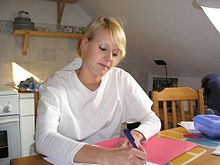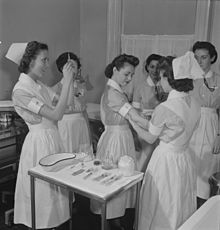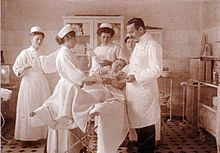Nurse
![]()
This article describes the profession in Germany. For Austria see Krankenpflegediplom, for Switzerland and Liechtenstein see Pflegefachfrau.
The health care nurse (in common parlance nurse, in short also nurse in the form of address) is a regulated medical profession in the German health care system. The job description includes the professional independent care, observation, supervision and counselling of patients and persons in need of care in an inpatient or outpatient setting as well as the documentation and evaluation of the nursing measures. The tasks also include carrying out medical orders and assisting with medical measures.
Since 2004/2007, permission to use the legally protected professional titles of nurse (Gesundheits- und Krankenpflegerin, Gesundheits- und Krankenpfleger, Gesundheits- und Kinderkrankenpflegerin or Gesundheits- und Kinderkrankenpfleger) has been granted on application after three years of training at a state-recognised nursing school and successful completion of a state examination. Nurses continue to be legally protected occupational titles. The same applies to the title of nurse (m/f; in the period 1988-2022). According to §§ 1 and 6 of the Nursing Professions Act (PflBG), training courses beginning on or after 1 January 2020 are to conclude with the new professional title of nurse (m/f; in the period 1988-2022) after at least three years of vocational training from 2023.
Following basic nursing training, there are further training opportunities for almost all specialised areas of nursing, which lead to an extended professional title within the framework of school-based specialist further training (specialist health care and nursing). Further qualification opportunities are offered by nursing science, pedagogy and economics courses of study, for which, as a rule, the completed training as a health and nursing professional is a prerequisite.

Health care worker and nurse at the desk work
Job title
With the amendment of the Nursing Professions Act (Krankenpflegegesetz - KrPflG) of 1985 by resolution of the Bundestag in July 2003, the fourth Nursing Act of the Federal Republic of Germany came into force on 1 January 2004. This introduced a new, state-protected occupational title of health care worker and nurse for nurses trained after 1 January 2004, replacing the previous titles of nurse (which still originated from the old Christian orderly system) and nurse respectively. The legal protection of the former occupational titles was not abolished in the process; nurses trained under the third KrpflG, nurse practitioners, paediatric nurses and paediatric nurses may either continue to use the previous occupational title or use the new title.
The designation health care worker and nurse takes into account the changed professional self-image of nursing, emphasises the increasing independence and professionalisation of nursing and expresses an expanded range of tasks of professional nursing in the direction of health care and counselling. At the same time, this is intended to replace the "ideologically shaped" occupational title of nurse. With the gradual merging of nursing training with that in paediatric nursing and in geriatric nursing into a generalist nursing profession by the Nursing Professions Act, from 2020 the job title will be changed in part to nursing specialist. Primary qualified university graduates will use the new job title in conjunction with the academic degree (§§ 37 to 39 PflBG). A planned evaluation of future occupational choices is to decide on the initially existing continuation of the occupational titles of health and paediatric nurse and geriatric nurse.
Nursing job titles from other countries such as Switzerland (Diplomierter Pflegefachmann), France (Infirmier), Sweden (Sjuksköterska) or the Anglo-American area (Nurse) are usually based on academic training and cannot be fully equated with the German dual training to become a health and nursing professional. However, the degrees are usually mutually recognised. Under the EU Directive on the mutual recognition of professional qualifications, it is possible for German nurses to work within the EU and Switzerland.
However, the term "health care worker" has not yet become established in general linguistic usage. Traditionally, the terms nurse or nurse practitioner continue to be used, both by patients and even by the holders of the corresponding professional title.
Professional activity and fields of work
Alongside firefighters and doctors, health care workers and nurses ("Krankenschwestern") consistently rank among the three most trusted professions in Germany. 87% of the population expresses "very high" or "fairly high" trust in them.
Tasks and activities
Health care and nursing staff independently care for patients or persons in need of care of all age groups in inpatient facilities or in the context of outpatient care. These tasks in the field of basic care include supporting the patient in all everyday areas of life, for example in feeding, position support or personal hygiene. They accompany the seriously ill and dying, care for the deceased and serve as contact persons for relatives or other persons concerned. Nursing specialists plan nursing care within the framework of the nursing process, document its implementation and assess the success of the nursing measures applied. They carry out the necessary nursing service-related accounting, organisational and administrative work with the help of nursing assistant programmes, and monitor and order materials and medication stocks. They provide assistance and guidance to trainees, nursing assistants, interns and housekeeping staff.
Nursing staff are the link between doctors, therapists, relatives and patients, independently carry out medical orders within the framework of treatment care, prepare patients for therapeutic and diagnostic measures or carry out ordered necessary medical treatments. They assist doctors in carrying out therapeutic measures and provide psychological care for patients. They perform administrative and organisational tasks, coordinate appointments with other specialist departments and members of the therapeutic team, and take part in ward rounds and meetings. As part of patient observation, they determine and document the data required for therapy, such as blood pressure, pulse and temperature, and assess the patient's sleep patterns, breathing and behaviour.
Health care and nursing staff advise people in need of care and their relatives about care measures, health promotion and guide them to help themselves. They help with the procurement of necessary aids, participate in the communication with health insurance companies and the determination of the need for care by the Medical Service of the Health Insurance (MDK).
This includes in particular:
- Independent areas of activity
- Nursing history
- Nursing diagnosis
- Care planning
- Maintenance measures
- Nursing Evaluation
- Information on health promotion measures
- Psychosocial care
- Documentation
- Organization of care
- Guidance and supervision of pupils and support staff
- Participation in nursing research
- Co-responsible areas of activity
- Carrying out diagnostic and therapeutic measures according to medical orders
- drug administration
- Preparation of injections
- Administration of subcutaneous and intramuscular injections
- Preparation and connection of infusions
- Blood sampling from the vein and capillaries
- Placement of transurethral bladder catheters
- Execution of intestinal enemas
- Placement of gastric tubes
- More interdisciplinary areas of activity
- Participation in measures for the prevention of illness and accidents
- Preparation of patients and people in need of care for discharge
- Health advice
- Counselling during and after a physical illness
Suitability
With regard to the use of allergenic products, there should be no allergies to these products, especially if they are hardly or not replaceable by alternatives (e.g. certain hand disinfectants). Shift work with early, late, night shifts and weekend duties can cause additional physical stress. Training companies usually require a medical certificate of health. Working with sick and dying people is psychologically stressful. Some educational institutions also require a certificate of good conduct.
Work locations
Typical places of work are the specialist departments in general hospitals, specialist hospitals (for example for psychiatry), sanatoria and rehabilitation facilities, as well as in dialysis centres, nursing homes, homes for the elderly and hospices and with general or specialised outpatient nursing services. Some health and nursing professionals work on a self-employed basis as nursing consultants or are employed by the MDK (Medical Review Board), in advice centres, health offices, nursing care support centres and by health or nursing care insurance companies in advisory or expert opinion functions. In case management, they draw up assistance plans and link medical care, nursing care, social support and domestic help in transitional care. Some nursing specialists are employed as non-commissioned officers in the medical service of the German armed forces, work in shipping as ship's nurses or as civil servant health and nursing staff in correctional hospitals and wards in correctional institutions.

Nursing education in the USA (1942)

Nurses in the operating room (1910)
Search within the encyclopedia